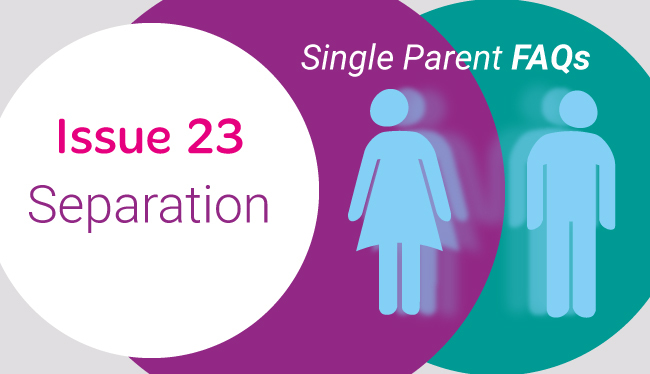Single Parent FAQs: Separation – Issue 23

07/09/2023
Our advice and information team who work on our Lone Parent Helpline, webchat and Ask a Question feature, receive questions from single parents around Scotland every day.
Separation can be a difficult topic to discuss, and it is something we receive a lot of questions on.

Take a look at the FAQ's
My wife and I have decided to separate. It’s been a long discussion. We are now needing to tell our children. Do you have any advice on speaking to them about it?
Talking to children about separation is one of the hardest things you could do as a parent and recognising this is important.
Where possible, children benefit from safe and positive relationships with both parents. When parents separate, children can feel anxious and upset. Being open and honest with children can help them process their feelings.
It is natural for children to be upset and confused. Being honest when talking about it will help but keep in mind the child’s age and understanding. Younger children will understand the details of what’s happening less than older children. Let your children know it’s ok to talk about how they are feeling, and it is ok to feel sad and angry.
As much as talking to your child is important, listening to them is even more important. Be there for them. Listen to their feelings and how separation is impacting them.
Avoid blaming the other parent and don’t share any negative feelings you may have. Keeping to your routines such as bedtime, school and dinner can help your child through the massive change.
There are a number of resources and books that can help your children learn about separation:
Two of Everything by Babette Cole, 2000 This is a ‘funny’ book for children, from 6 to 12 years, that tells the story of parents being ‘unmarried’.
When Mom and Dad Separate by Marge Heegaard, 1991 A workbook for children (5 to 12 years) to work out their feelings about separation and divorce
Where Did You Go Today? By Jenny Duke (4-6 years)
A little girl goes to the park with her dad and has a fantastic time. The book has fewer than 60 words yet positively depicts what appears to be a separated or divorced dad visiting his daughter for a play date as a part of everyday life.
My Family’s Changing By Pat Thomas Illustrator: Lesley Harker (4-8 years)
The issue of divorce is presented here in a simple and straightforward way, supported by colourful illustrations.
I have recently separated, and we are struggling to agree as to where the children will live and what time they will spend with each of us, do you have any advice?
Deciding where your child will live is probably the first thing you will talk about when you separate. The most important thing to consider is the child and their welfare. If your child attends school, what are the practicalities of living in a different area?
Does your child have hobbies or clubs they attend regularly? Friendship groups within the area they live? Working these details out are important. Maintaining as much stability as possible will help your child during separation.
When it comes to each parent spending time with the children it is important to recognise the impact that separation will have on your children and how you can minimise that. Most parents try and aim for an equal share of time with each household during separation. This is known as joint custody or 50/50 custody.
This can be hard with work and school commitments. If your ex-partner is not able to care for the children on a 50/50 basis, you could look at other ways of keeping them involved in your children’s life. If your children are old enough, they could keep in contact with their parent through texts, WhatsApp or videocalls. This might help them through those periods where they aren’t able to physically be with their parent.
I separated from my ex-partner a year ago and now my daughter needs routine surgery, my ex is does not want her to have the surgery. What can I do?
It is important that your child has consistent health care while with both of their parents. It can be difficult when there are differences of opinion over treatments. The first step may be to ask the other parent why they do not want the surgery to go ahead? Listening to their concerns may allow you to provide reassurance. As long as both parents have parental rights and responsibilities, they will have equal involvement in essential decision-making in the child’s life. Parental responsibility
A mother automatically has parental responsibility for her child from birth. A father usually has parental responsibility if he’s either:
- married to the child’s mother.
- listed on the birth certificate (after a certain date, depending on which part of the UK the child was born in)
- You can apply for parental responsibility if you do not automatically have it
Things to think about:
What do the medical professionals involved recommend?
What is the benefit in my child receiving this treatment?
Is there a compromise that can be made?
What is the best outcome for my child?
There are limits on what parents are entitled to decide, however, and they are not entitled to inappropriate treatment for their children or to refuse treatment which is in the child’s best interests. For example, where children need blood products to prevent death or serious deterioration, a refusal by a parent who is a Jehovah’s Witness is unlikely to be binding on doctors.
I separated from my child’s mother 3 years ago, since then my child has started school. I am finding it difficult to be involved in his school life. Have you any advice as to how I can play a more active part?
It’s natural you’ll both want to be involved in your child’s education. It can be more difficult for parents who don’t live with their child. Often school communications are sent to the parent the child lives with. This means you can miss out on decisions about which subjects children will take, school trips and after school clubs.
If you have a good relationship with the other parent, it is worth speaking to them and coming up with a way of sharing the information. Sometimes life is so hectic, and they may not realise that you aren’t getting the information. Agreeing how you’ll share information will help your child feel more supported and make them feel they can approach you with any issues around school.
Speak to the school. If you have Parental Rights, then you can request to be kept updated via email or text about any upcoming school events. If you can agree to do this jointly, it will help make it clear to school staff that you both want to stay involved and set a positive tone for the future.
Schools are required to keep parents informed about how their children are doing and to do what they can to help parents who don’t live with their children to be involved with their child’s education. As part of this, schools should provide relevant information and reports to parents who don’t live with their children unless there is a specific legal order preventing them from doing so.
Finally, schools are always happy to have parent volunteers with things like school discos, trips, and sports days. You could sign up to help at a school events? Or become part of the Parent Council? These are just some ways you can be involved in your child school life and be there for them during those times and it will help them to feel secure and help you to feel involved.
This is the first year I will be celebrating Christmas after separating from my wife. We have 3 children. Can you give me any advice on how to manage this? I am struggling with thinking about not being with them during these special days.
Where children spend birthdays, Christmas, New Year, Mother’s and Father’s Day and other religious or cultural festivals is one of the reoccurring themes we see at the Lone Parent Helpline. Discussing arrangements beforehand can help avoid disappointments and disputes. Christmas and other major religious holidays can become big issues. Some parents decide to alternate years when it comes to Christmas or other religious holidays. On the years they don’t have care of their children then they plan a special celebration on another day, such as Boxing Day. It is a good idea to talk to your children and see what they would like to happen.
It can be hard when you are facing your first Christmas without being together as a family. It is important to recognise the pressure we all face at Christmas. Making your children’s time with you as special as possible is the most important thing. As hard as it is, many children of separated parents come to enjoy having ‘two Christmases’. The joy of spending time with both parents, even separately is the most important memory for any child.

See our previous issues of Single Parent FAQs on:
- Having a baby
- Housing options
- Child maintenance
- Child contact
- Universal Credit
- Getting back into education as a single parent
- Financial support for single parents
- Bridging payments and help for Christmas
- Social Security Scotland
- What happens when my child gets older
- Separation and divorce
- Support for students
- Domestic abuse
- When does Child Benefit stop?
- Adult Disability Payments
- Child Maintenance
- What happens when my child gets older (2)
- Cost of Living
- Summer holidays
Remember you can submit your own question via the Ask A Question feature on our website any time and our expert advisers will respond.